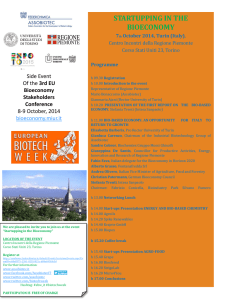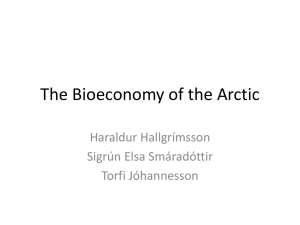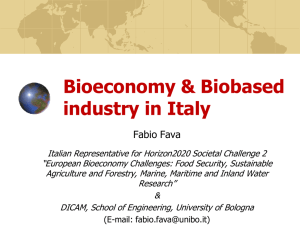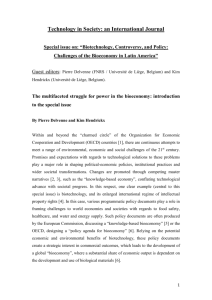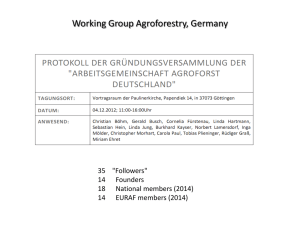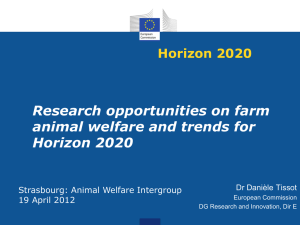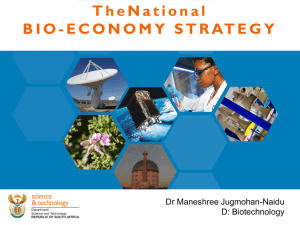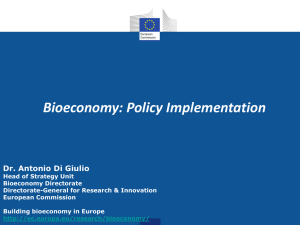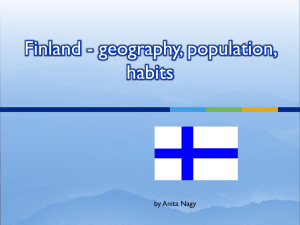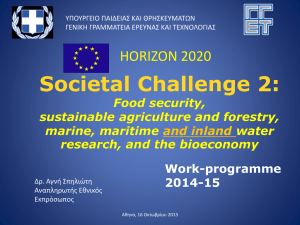Bioeconomy - Biotalous
advertisement
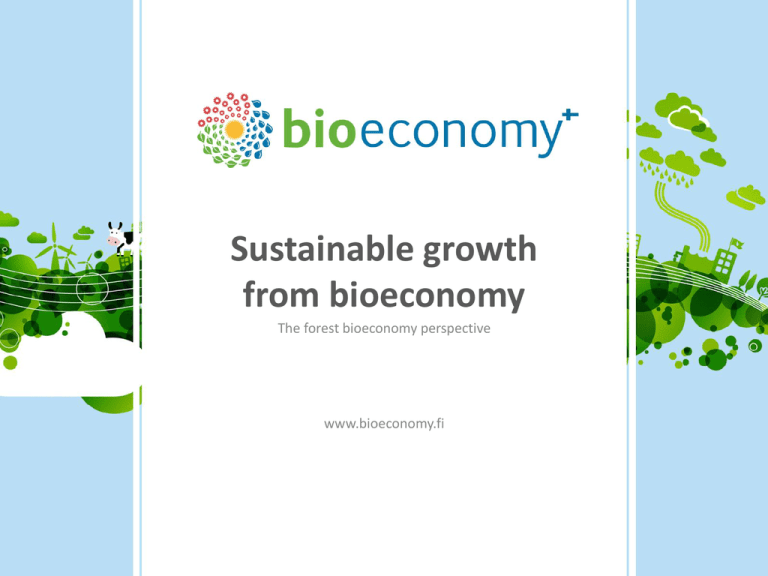
Sustainable growth from bioeconomy The forest bioeconomy perspective www.bioeconomy.fi Bioeconomy: The next economic wave GDP and wellbeing Fossil economy Natural resource economy 1900 2014 2030 The next wave of economy is bioeconomy, which produces economic growth and wellbeing. Finland is a bioeconomy superpower. We have plenty of natural resources, expertise and agility. Bioeconomy: Born from necessity 50 % more food 30 % more water Due to population growth, by 2030 the world will need: People are forced to find alternatives to non-renewable raw materials. • Climate change • Scarcity of non-renewable raw materials etc… 45 % more energy Bioeconomy is the solution Bioeconomy: • Sustainably uses biological natural resources to produce goods, energy, food and services Aims: • decrease dependency on fossil raw materials • prevent deprivation of ecosystems • promote economic development and create new jobs Bioeconomy’s significance in Finland Turnover €60bn Share of employment 13% Share of exports 26% Finland seeks to increase its bioeconomy output to 100bn euros by 2025 and to create 100,000 new jobs in the process. Bioeconomy combines wood processing, chemistry, energy, construction, technology food and health. About half of Finland’s bioeconomy consists of forest bioeconomy. Forest bioeconomy • Of our total land area, 80% is covered by forest, which is managed so that it produces significantly more wood than we currently use. • The forest-based industry is a Finnish pioneer in bioeconomy. It utilizes renewable natural resources while incorporating economic, social and ecological sustainability in its activities. The annual growth of Finnish forests 100 mill m³ Annual industrial use 55 mill m³ Teaming up to build a bioeconomic future • Cooperation and combination of technologies make Finland a true pioneer in bioeconomy. • Finland has strong expertise in forest, technology, construction, energy, chemistry as well as in food and health. • Together we have developed know-how, expertise, technologies and solutions that are not found anywhere else. Wood will serve many functions in the future Examples of products : Intelligent packaging that monitors the intake of medicine or edibility of food products “Remotecontrolled” paper price tags Flexible screens made of nanocellulose Sound systems and car parts made of wood composite Biodegradable packaging materials Chemistry enables bioeconomy Finland has plenty of expertise in chemistry, biochemistry and processes connected to handling biomasses. About a third of chemical industry companies use biobased raw materials. The use of these and biotechnology are on the increase. Smart refinement and use of biomasses, recycling and water purification. Biobased chemistry Examples close to consumers: Paints containing binders based on vegetable oils Advanced biofuels Biobased materials for packaging and medicine Cellulose gum as yoghurt thickening agent and tall oil products for glues Cosmetic creams containing forest berry ingredients Car tyres containing natural rubber and oils Energy from biomass • Renewable energy replaces fossil fuels and combats climate change. • Finland is a global pioneer in the coproduction of electricity and heat. This makes it possible to use wood-based fuels extensively and energy-efficiently. • New technology to refine biomass into pyrolysis oil, bio-gas and bio-coal will significantly increase the options to utilize bio-energy. • Most of Finland’s renewable energy is forest based. New food systems and decentralized solutions • • • • New business operations are created in the chemical and energy industries by utilizing closed cycles in food systems, bioprocessed products and livestock production sidestreams as well as field biomasses. Decentralized and regional operational models are being supplemented with local food production, regional energy selfsufficiency and vitality. Finland possesses high-standard expertise in the development of functional foods. Natural products produced in accordance with new consumer trends offer the bio-economy new business opportunities. Wooden construction boosts wellbeing Wooden construction can cut a building’s carbon footprint by 15-30%. A built environment containing wood has been shown to increase people’s wellbeing. Thanks to new innovations, wood offers more versatile solutions for building and interior design. Health from the forest Side streams of pulp production can be refined into: • Xylitol, a sweetener, which decreases the risk of dental cavities and children’s ear infections. • Plant sterol, which can lower cholesterol levels in blood. Pitch • is made into an ointment to treat skin cuts. Birch bark • Research is being carried out on betulin from birch bark, which may lower the activity of HIV. Berries and mushroom • Natural health promoting food ingredients, e.g. berries Solution-driven experts • Through cooperation and combining technologies, we can achieve wellness-promoting and sustainable products and services. • Technologies, procedures and expertise developed in Finland can be transferred and applied globally. • Bioeconomy solutions produced in Finland can advance sustainable global welfare. Strategic goals 1. COMPETITIVE ENVIRONMENT FOR BIOECONOMY 2. NEW BUSINESS FROM BIOECONOMY 3. STRONG KNOW-HOW BASE FOR BIOECONOMY 4. USABILITY AND SUSTAINABILITY OF BIOMASS Implementation and monitoring Finland’s bioeconomy strategy Sustainable bioeconomy solutions are the basis of Finland’s welfare and competitiveness. Bioeconomy value chains Wood processing Chemistry Biomass Energy Food Products Expertise Construction Ecosystem services Bioeconomy value chains produce goods, services and solutions sustainably and through clean technologies e.g. cleantech Ask a Finn! www.bioeconomy.fi Source of information: TEM Ministry of Employment and the Economy, Finland
